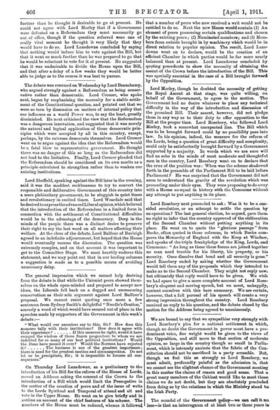Lord Morley, though he doubted the necessity of getting the
Royal Assent at that stage, was quite willing, on behalf of the Government, to agree to the motion. The Government had no desire whatever to place any technical difficulty in the way of the introduction and discussion of the promised Bill. Their assent, however, did not pledge them in any way as to their duty to offer opposition to the Bill at the proper time. Lord Rosebery, who followed Lord Morley, took a somewhat unexpected line. The Bill which was to be brought forward could by no possibility pass into law. In his opinion, indeed, the measure for the reform of the Lords, being a question of great difficulty and complexity, could only be satisfactorily brought forward by a Government supported by a majority. In words which we are sure will find an echo in the minds of most moderate and thoughtful men in the country, Lord Rosebery went on to declare that the crux of the position was : When was the scheme shadowed forth in the preamble of the Parliament Bill to be laid before Parliament ? He was surprised that the Government did not seem to understand the gravity of the revolution which was proceeding under their eyes. They were proposing to do away with a House co-equal in history with the Commons without any attempt to put anything in its place.










































 Previous page
Previous page